Crisis Management in Egypt: COVID-19 Responses of Government & Hotels
VerifiedAdded on 2022/01/20
|35
|14394
|216
Report
AI Summary
This study employs a content analysis, drawing on the Situational Crisis Communication Theory (SCCT), to examine the responses of the Egyptian government and chain-managed five-star hotels to the COVID-19 pandemic. The research analyzes newspapers, magazines, TV channels, official Facebook pages, and hotel websites to identify initiatives, practices, and strategies. Findings reveal that both the government and hotels implemented measures related to financial policies, health and hygiene, workforce management, marketing, domestic tourism, booking flexibility, and community support. The study contributes to crisis management research by providing a case study of Egypt during the COVID-19 pandemic, discussing theoretical and practical implications. The analysis also highlights the economic impact of the pandemic on tourism, the government's role in supporting the hospitality industry, and the hotels' adaptation to the crisis, including adjustments in operations and communication strategies. The research underscores the need for further studies on crisis management and organizational resilience in the tourism sector.
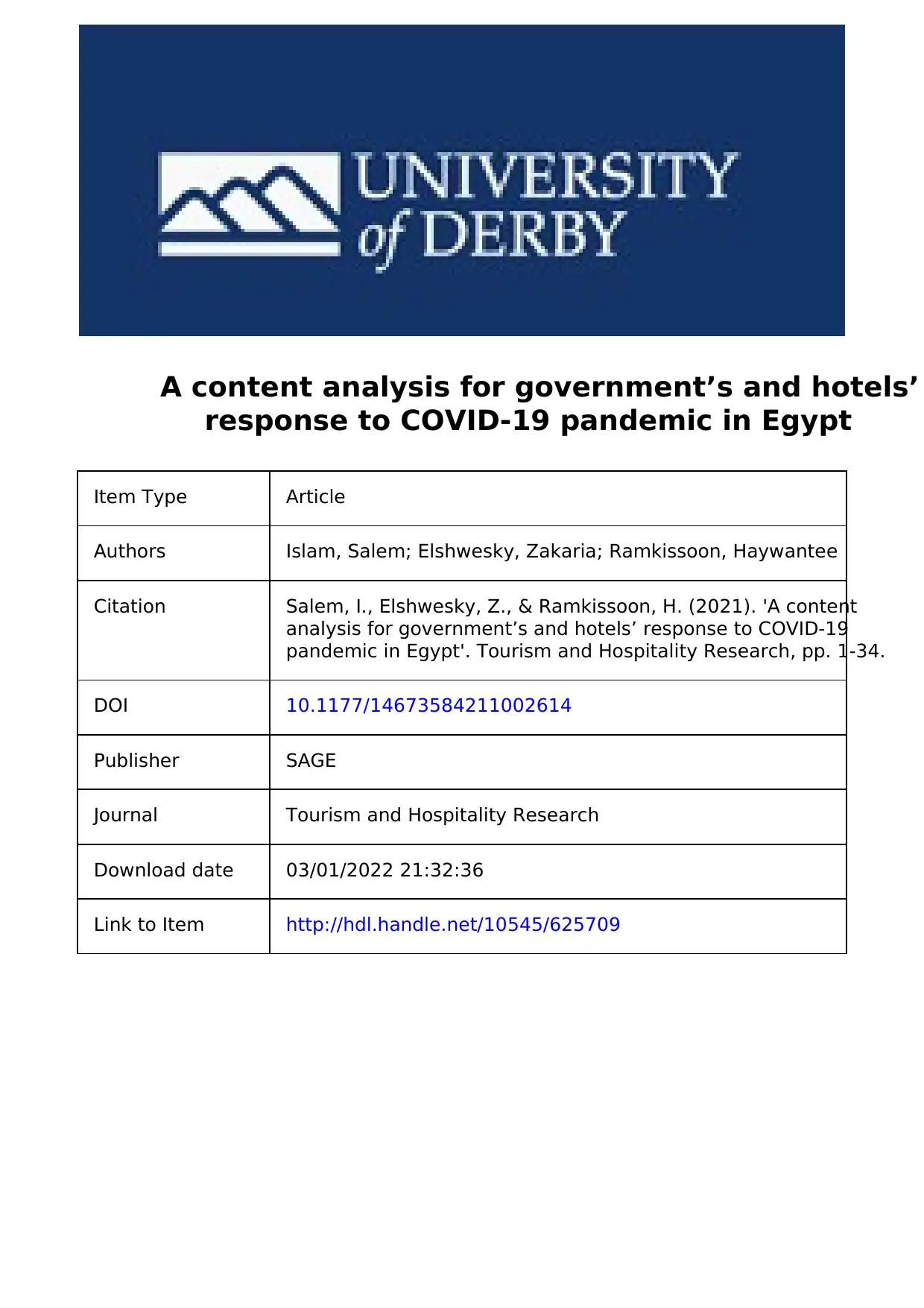
A content analysis for government’s and hotels’
response to COVID-19 pandemic in Egypt
Item Type Article
Authors Islam, Salem; Elshwesky, Zakaria; Ramkissoon, Haywantee
Citation Salem, I., Elshwesky, Z., & Ramkissoon, H. (2021). 'A content
analysis for government’s and hotels’ response to COVID-19
pandemic in Egypt'. Tourism and Hospitality Research, pp. 1-34.
DOI 10.1177/14673584211002614
Publisher SAGE
Journal Tourism and Hospitality Research
Download date 03/01/2022 21:32:36
Link to Item http://hdl.handle.net/10545/625709
response to COVID-19 pandemic in Egypt
Item Type Article
Authors Islam, Salem; Elshwesky, Zakaria; Ramkissoon, Haywantee
Citation Salem, I., Elshwesky, Z., & Ramkissoon, H. (2021). 'A content
analysis for government’s and hotels’ response to COVID-19
pandemic in Egypt'. Tourism and Hospitality Research, pp. 1-34.
DOI 10.1177/14673584211002614
Publisher SAGE
Journal Tourism and Hospitality Research
Download date 03/01/2022 21:32:36
Link to Item http://hdl.handle.net/10545/625709
Paraphrase This Document
Need a fresh take? Get an instant paraphrase of this document with our AI Paraphraser
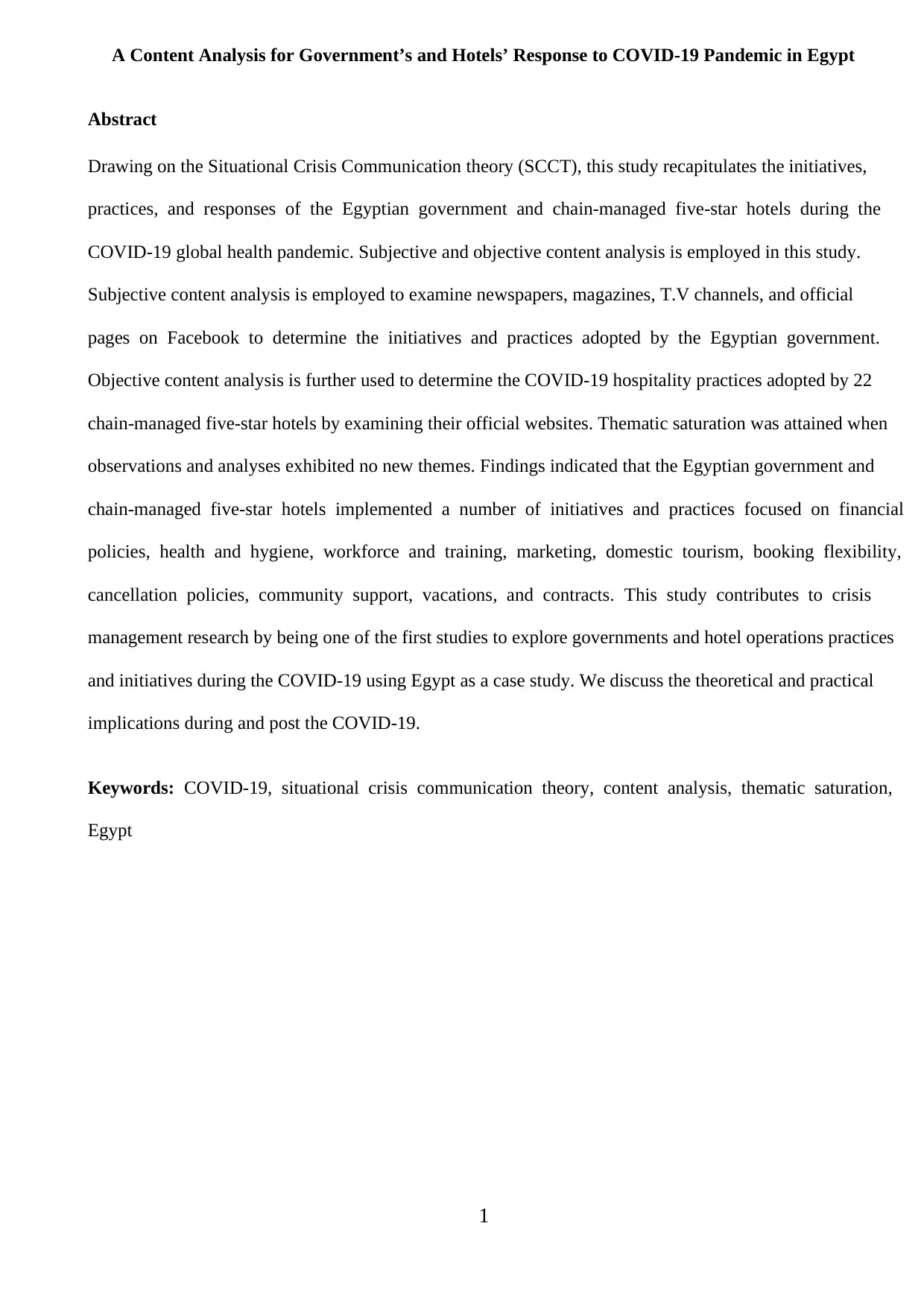
1
A Content Analysis for Government’s and Hotels’ Response to COVID-19 Pandemic in Egypt
Abstract
Drawing on the Situational Crisis Communication theory (SCCT), this study recapitulates the initiatives,
practices, and responses of the Egyptian government and chain-managed five-star hotels during the
COVID-19 global health pandemic. Subjective and objective content analysis is employed in this study.
Subjective content analysis is employed to examine newspapers, magazines, T.V channels, and official
pages on Facebook to determine the initiatives and practices adopted by the Egyptian government.
Objective content analysis is further used to determine the COVID-19 hospitality practices adopted by 22
chain-managed five-star hotels by examining their official websites. Thematic saturation was attained when
observations and analyses exhibited no new themes. Findings indicated that the Egyptian government and
chain-managed five-star hotels implemented a number of initiatives and practices focused on financial
policies, health and hygiene, workforce and training, marketing, domestic tourism, booking flexibility,
cancellation policies, community support, vacations, and contracts. This study contributes to crisis
management research by being one of the first studies to explore governments and hotel operations practices
and initiatives during the COVID-19 using Egypt as a case study. We discuss the theoretical and practical
implications during and post the COVID-19.
Keywords: COVID-19, situational crisis communication theory, content analysis, thematic saturation,
Egypt
A Content Analysis for Government’s and Hotels’ Response to COVID-19 Pandemic in Egypt
Abstract
Drawing on the Situational Crisis Communication theory (SCCT), this study recapitulates the initiatives,
practices, and responses of the Egyptian government and chain-managed five-star hotels during the
COVID-19 global health pandemic. Subjective and objective content analysis is employed in this study.
Subjective content analysis is employed to examine newspapers, magazines, T.V channels, and official
pages on Facebook to determine the initiatives and practices adopted by the Egyptian government.
Objective content analysis is further used to determine the COVID-19 hospitality practices adopted by 22
chain-managed five-star hotels by examining their official websites. Thematic saturation was attained when
observations and analyses exhibited no new themes. Findings indicated that the Egyptian government and
chain-managed five-star hotels implemented a number of initiatives and practices focused on financial
policies, health and hygiene, workforce and training, marketing, domestic tourism, booking flexibility,
cancellation policies, community support, vacations, and contracts. This study contributes to crisis
management research by being one of the first studies to explore governments and hotel operations practices
and initiatives during the COVID-19 using Egypt as a case study. We discuss the theoretical and practical
implications during and post the COVID-19.
Keywords: COVID-19, situational crisis communication theory, content analysis, thematic saturation,
Egypt
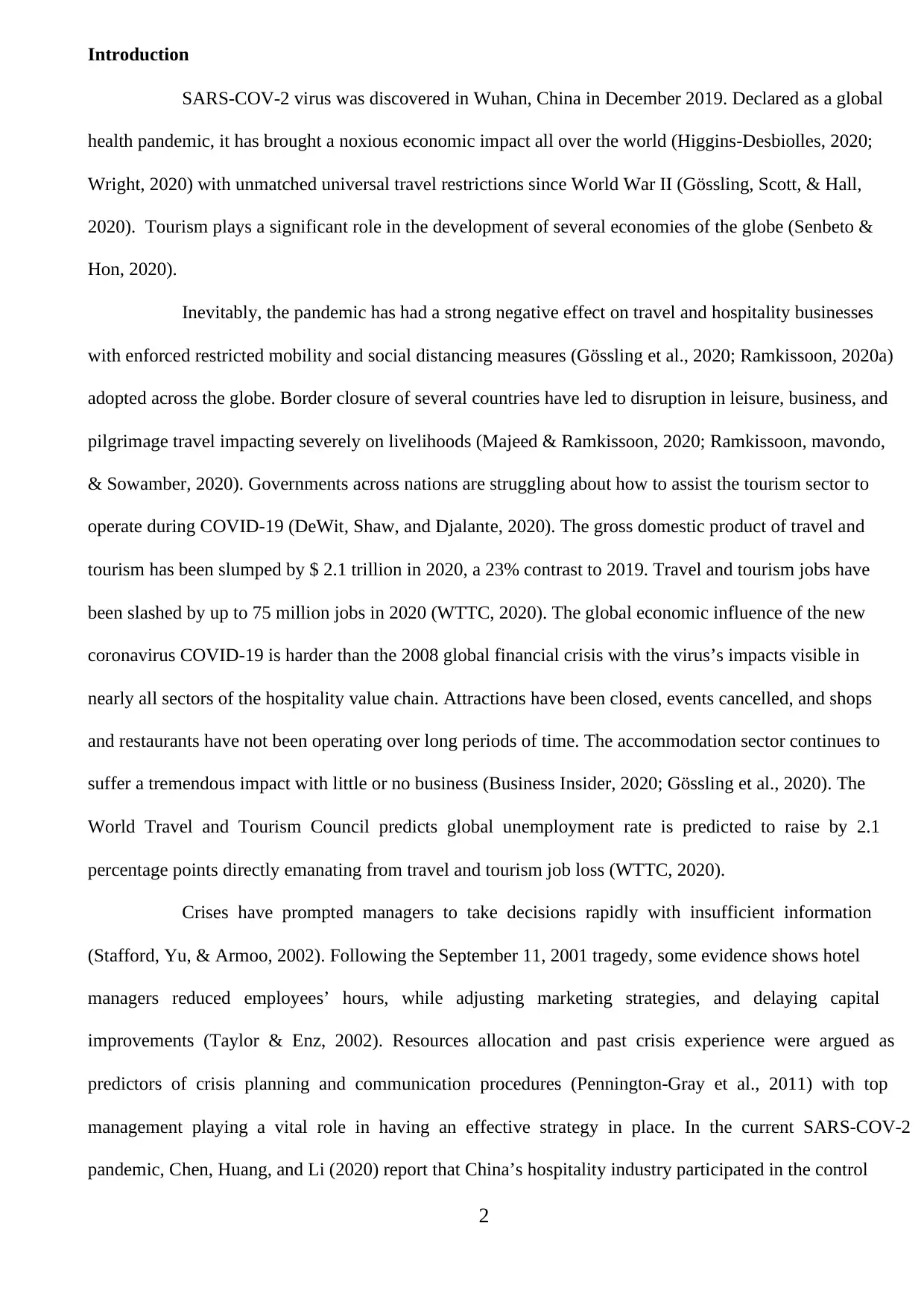
2
Introduction
SARS-COV-2 virus was discovered in Wuhan, China in December 2019. Declared as a global
health pandemic, it has brought a noxious economic impact all over the world (Higgins-Desbiolles, 2020;
Wright, 2020) with unmatched universal travel restrictions since World War II (Gössling, Scott, & Hall,
2020). Tourism plays a significant role in the development of several economies of the globe (Senbeto &
Hon, 2020).
Inevitably, the pandemic has had a strong negative effect on travel and hospitality businesses
with enforced restricted mobility and social distancing measures (Gössling et al., 2020; Ramkissoon, 2020a)
adopted across the globe. Border closure of several countries have led to disruption in leisure, business, and
pilgrimage travel impacting severely on livelihoods (Majeed & Ramkissoon, 2020; Ramkissoon, mavondo,
& Sowamber, 2020). Governments across nations are struggling about how to assist the tourism sector to
operate during COVID-19 (DeWit, Shaw, and Djalante, 2020). The gross domestic product of travel and
tourism has been slumped by $ 2.1 trillion in 2020, a 23% contrast to 2019. Travel and tourism jobs have
been slashed by up to 75 million jobs in 2020 (WTTC, 2020). The global economic influence of the new
coronavirus COVID-19 is harder than the 2008 global financial crisis with the virus’s impacts visible in
nearly all sectors of the hospitality value chain. Attractions have been closed, events cancelled, and shops
and restaurants have not been operating over long periods of time. The accommodation sector continues to
suffer a tremendous impact with little or no business (Business Insider, 2020; Gössling et al., 2020). The
World Travel and Tourism Council predicts global unemployment rate is predicted to raise by 2.1
percentage points directly emanating from travel and tourism job loss (WTTC, 2020).
Crises have prompted managers to take decisions rapidly with insufficient information
(Stafford, Yu, & Armoo, 2002). Following the September 11, 2001 tragedy, some evidence shows hotel
managers reduced employees’ hours, while adjusting marketing strategies, and delaying capital
improvements (Taylor & Enz, 2002). Resources allocation and past crisis experience were argued as
predictors of crisis planning and communication procedures (Pennington-Gray et al., 2011) with top
management playing a vital role in having an effective strategy in place. In the current SARS-COV-2
pandemic, Chen, Huang, and Li (2020) report that China’s hospitality industry participated in the control
Introduction
SARS-COV-2 virus was discovered in Wuhan, China in December 2019. Declared as a global
health pandemic, it has brought a noxious economic impact all over the world (Higgins-Desbiolles, 2020;
Wright, 2020) with unmatched universal travel restrictions since World War II (Gössling, Scott, & Hall,
2020). Tourism plays a significant role in the development of several economies of the globe (Senbeto &
Hon, 2020).
Inevitably, the pandemic has had a strong negative effect on travel and hospitality businesses
with enforced restricted mobility and social distancing measures (Gössling et al., 2020; Ramkissoon, 2020a)
adopted across the globe. Border closure of several countries have led to disruption in leisure, business, and
pilgrimage travel impacting severely on livelihoods (Majeed & Ramkissoon, 2020; Ramkissoon, mavondo,
& Sowamber, 2020). Governments across nations are struggling about how to assist the tourism sector to
operate during COVID-19 (DeWit, Shaw, and Djalante, 2020). The gross domestic product of travel and
tourism has been slumped by $ 2.1 trillion in 2020, a 23% contrast to 2019. Travel and tourism jobs have
been slashed by up to 75 million jobs in 2020 (WTTC, 2020). The global economic influence of the new
coronavirus COVID-19 is harder than the 2008 global financial crisis with the virus’s impacts visible in
nearly all sectors of the hospitality value chain. Attractions have been closed, events cancelled, and shops
and restaurants have not been operating over long periods of time. The accommodation sector continues to
suffer a tremendous impact with little or no business (Business Insider, 2020; Gössling et al., 2020). The
World Travel and Tourism Council predicts global unemployment rate is predicted to raise by 2.1
percentage points directly emanating from travel and tourism job loss (WTTC, 2020).
Crises have prompted managers to take decisions rapidly with insufficient information
(Stafford, Yu, & Armoo, 2002). Following the September 11, 2001 tragedy, some evidence shows hotel
managers reduced employees’ hours, while adjusting marketing strategies, and delaying capital
improvements (Taylor & Enz, 2002). Resources allocation and past crisis experience were argued as
predictors of crisis planning and communication procedures (Pennington-Gray et al., 2011) with top
management playing a vital role in having an effective strategy in place. In the current SARS-COV-2
pandemic, Chen, Huang, and Li (2020) report that China’s hospitality industry participated in the control
⊘ This is a preview!⊘
Do you want full access?
Subscribe today to unlock all pages.

Trusted by 1+ million students worldwide
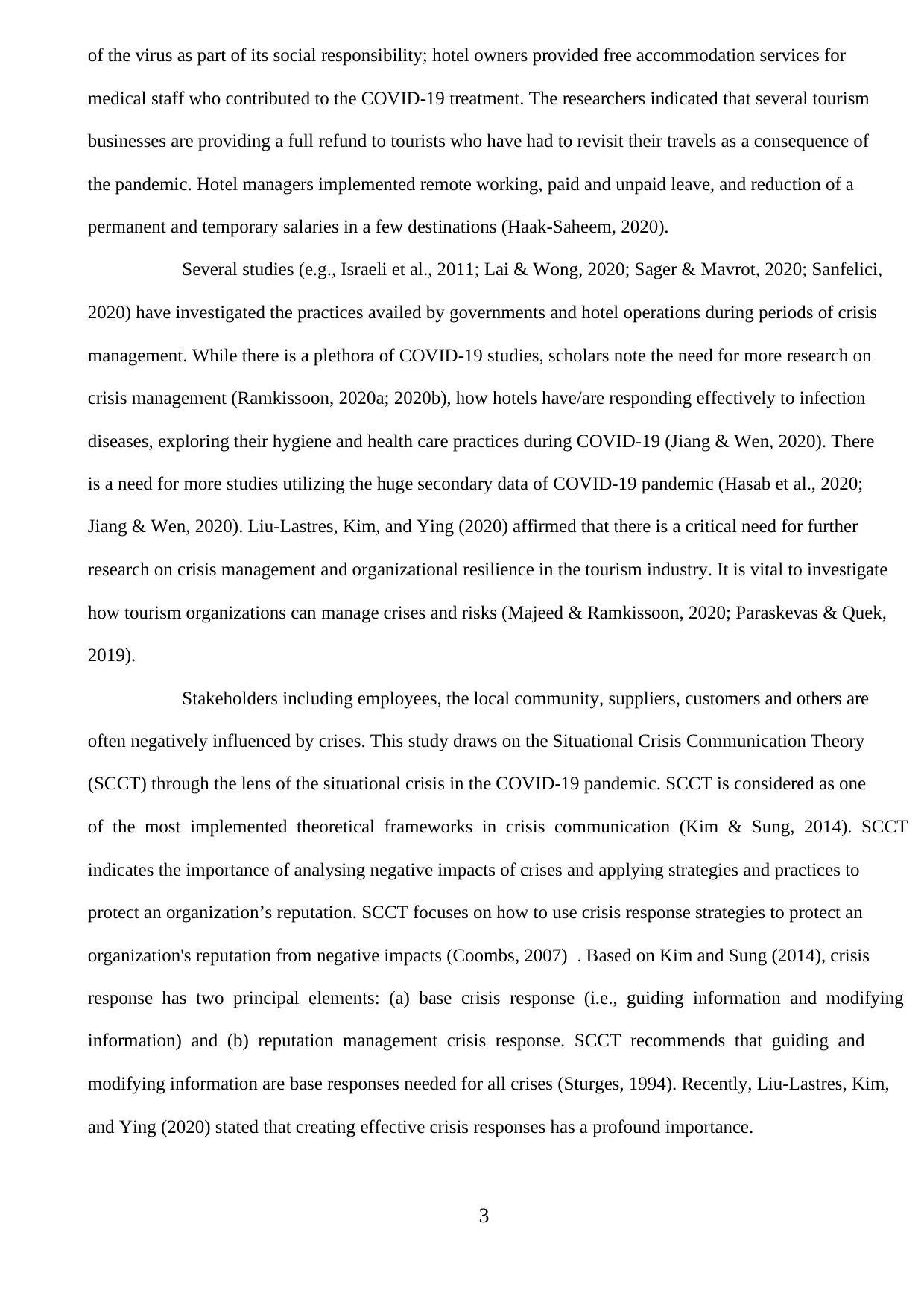
3
of the virus as part of its social responsibility; hotel owners provided free accommodation services for
medical staff who contributed to the COVID-19 treatment. The researchers indicated that several tourism
businesses are providing a full refund to tourists who have had to revisit their travels as a consequence of
the pandemic. Hotel managers implemented remote working, paid and unpaid leave, and reduction of a
permanent and temporary salaries in a few destinations (Haak-Saheem, 2020).
Several studies (e.g., Israeli et al., 2011; Lai & Wong, 2020; Sager & Mavrot, 2020; Sanfelici,
2020) have investigated the practices availed by governments and hotel operations during periods of crisis
management. While there is a plethora of COVID-19 studies, scholars note the need for more research on
crisis management (Ramkissoon, 2020a; 2020b), how hotels have/are responding effectively to infection
diseases, exploring their hygiene and health care practices during COVID-19 (Jiang & Wen, 2020). There
is a need for more studies utilizing the huge secondary data of COVID-19 pandemic (Hasab et al., 2020;
Jiang & Wen, 2020). Liu-Lastres, Kim, and Ying (2020) affirmed that there is a critical need for further
research on crisis management and organizational resilience in the tourism industry. It is vital to investigate
how tourism organizations can manage crises and risks (Majeed & Ramkissoon, 2020; Paraskevas & Quek,
2019).
Stakeholders including employees, the local community, suppliers, customers and others are
often negatively influenced by crises. This study draws on the Situational Crisis Communication Theory
(SCCT) through the lens of the situational crisis in the COVID-19 pandemic. SCCT is considered as one
of the most implemented theoretical frameworks in crisis communication (Kim & Sung, 2014). SCCT
indicates the importance of analysing negative impacts of crises and applying strategies and practices to
protect an organization’s reputation. SCCT focuses on how to use crisis response strategies to protect an
organization's reputation from negative impacts (Coombs, 2007) . Based on Kim and Sung (2014), crisis
response has two principal elements: (a) base crisis response (i.e., guiding information and modifying
information) and (b) reputation management crisis response. SCCT recommends that guiding and
modifying information are base responses needed for all crises (Sturges, 1994). Recently, Liu-Lastres, Kim,
and Ying (2020) stated that creating effective crisis responses has a profound importance.
of the virus as part of its social responsibility; hotel owners provided free accommodation services for
medical staff who contributed to the COVID-19 treatment. The researchers indicated that several tourism
businesses are providing a full refund to tourists who have had to revisit their travels as a consequence of
the pandemic. Hotel managers implemented remote working, paid and unpaid leave, and reduction of a
permanent and temporary salaries in a few destinations (Haak-Saheem, 2020).
Several studies (e.g., Israeli et al., 2011; Lai & Wong, 2020; Sager & Mavrot, 2020; Sanfelici,
2020) have investigated the practices availed by governments and hotel operations during periods of crisis
management. While there is a plethora of COVID-19 studies, scholars note the need for more research on
crisis management (Ramkissoon, 2020a; 2020b), how hotels have/are responding effectively to infection
diseases, exploring their hygiene and health care practices during COVID-19 (Jiang & Wen, 2020). There
is a need for more studies utilizing the huge secondary data of COVID-19 pandemic (Hasab et al., 2020;
Jiang & Wen, 2020). Liu-Lastres, Kim, and Ying (2020) affirmed that there is a critical need for further
research on crisis management and organizational resilience in the tourism industry. It is vital to investigate
how tourism organizations can manage crises and risks (Majeed & Ramkissoon, 2020; Paraskevas & Quek,
2019).
Stakeholders including employees, the local community, suppliers, customers and others are
often negatively influenced by crises. This study draws on the Situational Crisis Communication Theory
(SCCT) through the lens of the situational crisis in the COVID-19 pandemic. SCCT is considered as one
of the most implemented theoretical frameworks in crisis communication (Kim & Sung, 2014). SCCT
indicates the importance of analysing negative impacts of crises and applying strategies and practices to
protect an organization’s reputation. SCCT focuses on how to use crisis response strategies to protect an
organization's reputation from negative impacts (Coombs, 2007) . Based on Kim and Sung (2014), crisis
response has two principal elements: (a) base crisis response (i.e., guiding information and modifying
information) and (b) reputation management crisis response. SCCT recommends that guiding and
modifying information are base responses needed for all crises (Sturges, 1994). Recently, Liu-Lastres, Kim,
and Ying (2020) stated that creating effective crisis responses has a profound importance.
Paraphrase This Document
Need a fresh take? Get an instant paraphrase of this document with our AI Paraphraser
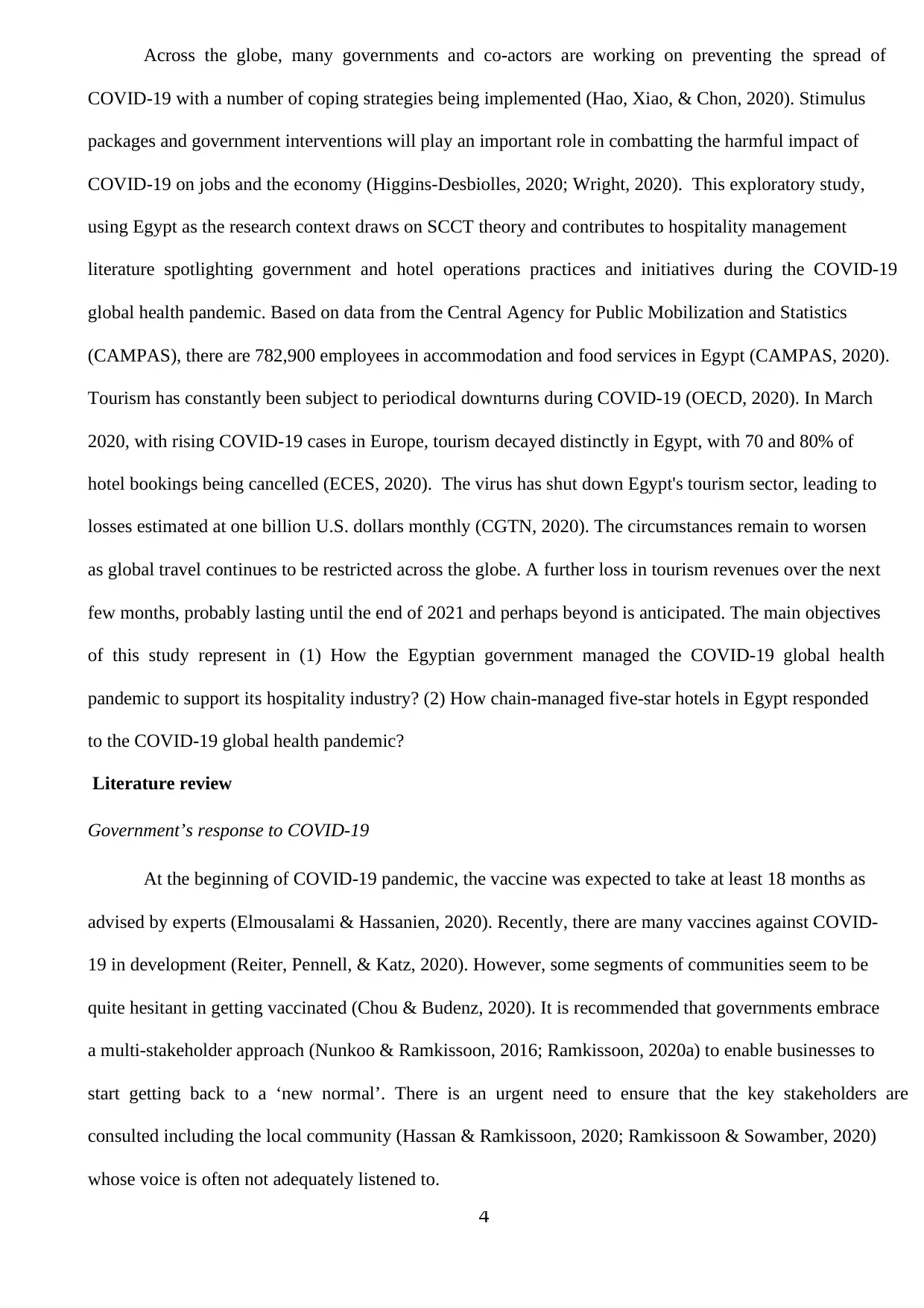
4
Across the globe, many governments and co-actors are working on preventing the spread of
COVID-19 with a number of coping strategies being implemented (Hao, Xiao, & Chon, 2020). Stimulus
packages and government interventions will play an important role in combatting the harmful impact of
COVID-19 on jobs and the economy (Higgins-Desbiolles, 2020; Wright, 2020). This exploratory study,
using Egypt as the research context draws on SCCT theory and contributes to hospitality management
literature spotlighting government and hotel operations practices and initiatives during the COVID-19
global health pandemic. Based on data from the Central Agency for Public Mobilization and Statistics
(CAMPAS), there are 782,900 employees in accommodation and food services in Egypt (CAMPAS, 2020).
Tourism has constantly been subject to periodical downturns during COVID-19 (OECD, 2020). In March
2020, with rising COVID-19 cases in Europe, tourism decayed distinctly in Egypt, with 70 and 80% of
hotel bookings being cancelled (ECES, 2020). The virus has shut down Egypt's tourism sector, leading to
losses estimated at one billion U.S. dollars monthly (CGTN, 2020). The circumstances remain to worsen
as global travel continues to be restricted across the globe. A further loss in tourism revenues over the next
few months, probably lasting until the end of 2021 and perhaps beyond is anticipated. The main objectives
of this study represent in (1) How the Egyptian government managed the COVID-19 global health
pandemic to support its hospitality industry? (2) How chain-managed five-star hotels in Egypt responded
to the COVID-19 global health pandemic?
Literature review
Government’s response to COVID-19
At the beginning of COVID-19 pandemic, the vaccine was expected to take at least 18 months as
advised by experts (Elmousalami & Hassanien, 2020). Recently, there are many vaccines against COVID-
19 in development (Reiter, Pennell, & Katz, 2020). However, some segments of communities seem to be
quite hesitant in getting vaccinated (Chou & Budenz, 2020). It is recommended that governments embrace
a multi-stakeholder approach (Nunkoo & Ramkissoon, 2016; Ramkissoon, 2020a) to enable businesses to
start getting back to a ‘new normal’. There is an urgent need to ensure that the key stakeholders are
consulted including the local community (Hassan & Ramkissoon, 2020; Ramkissoon & Sowamber, 2020)
whose voice is often not adequately listened to.
Across the globe, many governments and co-actors are working on preventing the spread of
COVID-19 with a number of coping strategies being implemented (Hao, Xiao, & Chon, 2020). Stimulus
packages and government interventions will play an important role in combatting the harmful impact of
COVID-19 on jobs and the economy (Higgins-Desbiolles, 2020; Wright, 2020). This exploratory study,
using Egypt as the research context draws on SCCT theory and contributes to hospitality management
literature spotlighting government and hotel operations practices and initiatives during the COVID-19
global health pandemic. Based on data from the Central Agency for Public Mobilization and Statistics
(CAMPAS), there are 782,900 employees in accommodation and food services in Egypt (CAMPAS, 2020).
Tourism has constantly been subject to periodical downturns during COVID-19 (OECD, 2020). In March
2020, with rising COVID-19 cases in Europe, tourism decayed distinctly in Egypt, with 70 and 80% of
hotel bookings being cancelled (ECES, 2020). The virus has shut down Egypt's tourism sector, leading to
losses estimated at one billion U.S. dollars monthly (CGTN, 2020). The circumstances remain to worsen
as global travel continues to be restricted across the globe. A further loss in tourism revenues over the next
few months, probably lasting until the end of 2021 and perhaps beyond is anticipated. The main objectives
of this study represent in (1) How the Egyptian government managed the COVID-19 global health
pandemic to support its hospitality industry? (2) How chain-managed five-star hotels in Egypt responded
to the COVID-19 global health pandemic?
Literature review
Government’s response to COVID-19
At the beginning of COVID-19 pandemic, the vaccine was expected to take at least 18 months as
advised by experts (Elmousalami & Hassanien, 2020). Recently, there are many vaccines against COVID-
19 in development (Reiter, Pennell, & Katz, 2020). However, some segments of communities seem to be
quite hesitant in getting vaccinated (Chou & Budenz, 2020). It is recommended that governments embrace
a multi-stakeholder approach (Nunkoo & Ramkissoon, 2016; Ramkissoon, 2020a) to enable businesses to
start getting back to a ‘new normal’. There is an urgent need to ensure that the key stakeholders are
consulted including the local community (Hassan & Ramkissoon, 2020; Ramkissoon & Sowamber, 2020)
whose voice is often not adequately listened to.
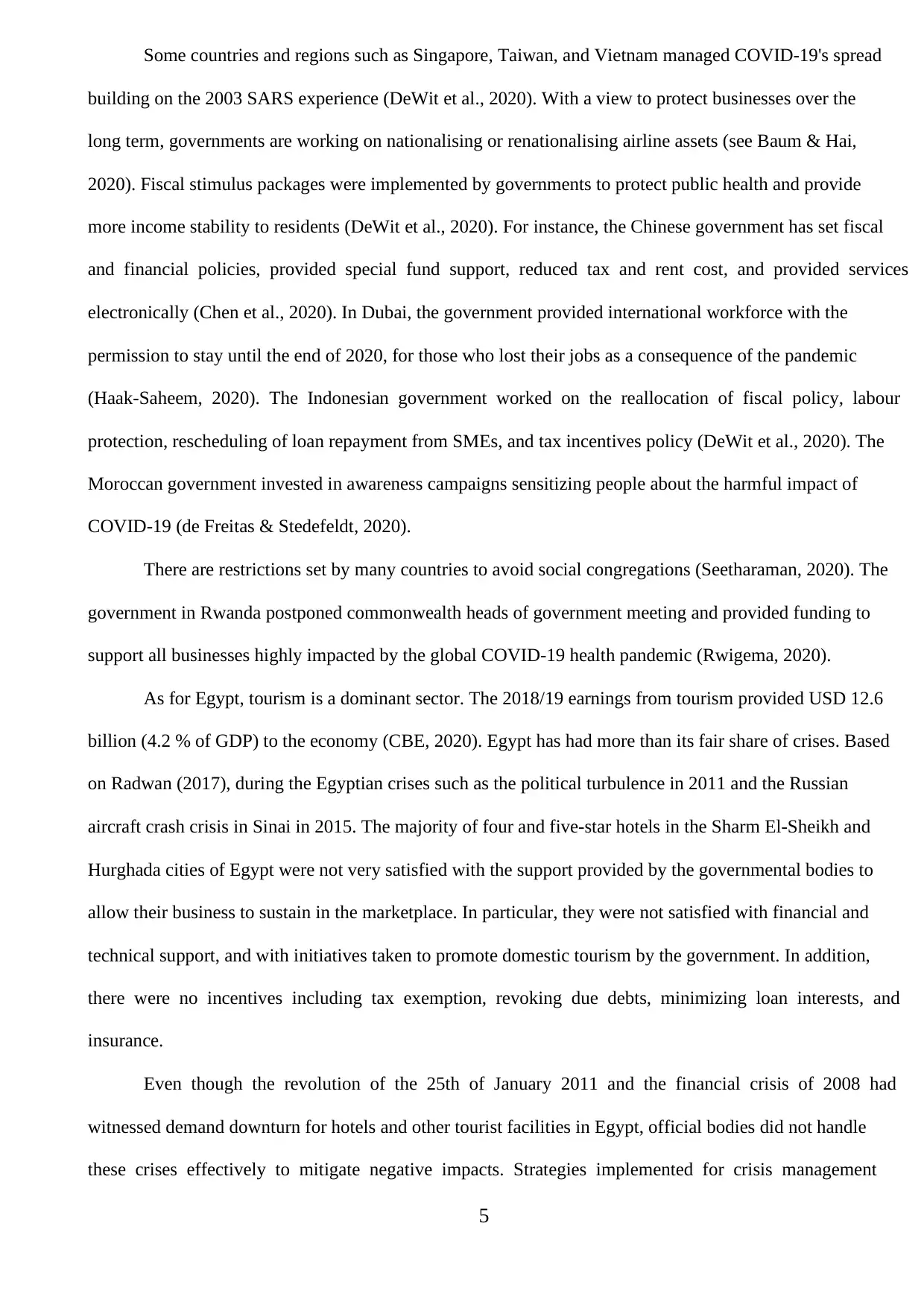
5
Some countries and regions such as Singapore, Taiwan, and Vietnam managed COVID-19's spread
building on the 2003 SARS experience (DeWit et al., 2020). With a view to protect businesses over the
long term, governments are working on nationalising or renationalising airline assets (see Baum & Hai,
2020). Fiscal stimulus packages were implemented by governments to protect public health and provide
more income stability to residents (DeWit et al., 2020). For instance, the Chinese government has set fiscal
and financial policies, provided special fund support, reduced tax and rent cost, and provided services
electronically (Chen et al., 2020). In Dubai, the government provided international workforce with the
permission to stay until the end of 2020, for those who lost their jobs as a consequence of the pandemic
(Haak-Saheem, 2020). The Indonesian government worked on the reallocation of fiscal policy, labour
protection, rescheduling of loan repayment from SMEs, and tax incentives policy (DeWit et al., 2020). The
Moroccan government invested in awareness campaigns sensitizing people about the harmful impact of
COVID-19 (de Freitas & Stedefeldt, 2020).
There are restrictions set by many countries to avoid social congregations (Seetharaman, 2020). The
government in Rwanda postponed commonwealth heads of government meeting and provided funding to
support all businesses highly impacted by the global COVID-19 health pandemic (Rwigema, 2020).
As for Egypt, tourism is a dominant sector. The 2018/19 earnings from tourism provided USD 12.6
billion (4.2 % of GDP) to the economy (CBE, 2020). Egypt has had more than its fair share of crises. Based
on Radwan (2017), during the Egyptian crises such as the political turbulence in 2011 and the Russian
aircraft crash crisis in Sinai in 2015. The majority of four and five-star hotels in the Sharm El-Sheikh and
Hurghada cities of Egypt were not very satisfied with the support provided by the governmental bodies to
allow their business to sustain in the marketplace. In particular, they were not satisfied with financial and
technical support, and with initiatives taken to promote domestic tourism by the government. In addition,
there were no incentives including tax exemption, revoking due debts, minimizing loan interests, and
insurance.
Even though the revolution of the 25th of January 2011 and the financial crisis of 2008 had
witnessed demand downturn for hotels and other tourist facilities in Egypt, official bodies did not handle
these crises effectively to mitigate negative impacts. Strategies implemented for crisis management
Some countries and regions such as Singapore, Taiwan, and Vietnam managed COVID-19's spread
building on the 2003 SARS experience (DeWit et al., 2020). With a view to protect businesses over the
long term, governments are working on nationalising or renationalising airline assets (see Baum & Hai,
2020). Fiscal stimulus packages were implemented by governments to protect public health and provide
more income stability to residents (DeWit et al., 2020). For instance, the Chinese government has set fiscal
and financial policies, provided special fund support, reduced tax and rent cost, and provided services
electronically (Chen et al., 2020). In Dubai, the government provided international workforce with the
permission to stay until the end of 2020, for those who lost their jobs as a consequence of the pandemic
(Haak-Saheem, 2020). The Indonesian government worked on the reallocation of fiscal policy, labour
protection, rescheduling of loan repayment from SMEs, and tax incentives policy (DeWit et al., 2020). The
Moroccan government invested in awareness campaigns sensitizing people about the harmful impact of
COVID-19 (de Freitas & Stedefeldt, 2020).
There are restrictions set by many countries to avoid social congregations (Seetharaman, 2020). The
government in Rwanda postponed commonwealth heads of government meeting and provided funding to
support all businesses highly impacted by the global COVID-19 health pandemic (Rwigema, 2020).
As for Egypt, tourism is a dominant sector. The 2018/19 earnings from tourism provided USD 12.6
billion (4.2 % of GDP) to the economy (CBE, 2020). Egypt has had more than its fair share of crises. Based
on Radwan (2017), during the Egyptian crises such as the political turbulence in 2011 and the Russian
aircraft crash crisis in Sinai in 2015. The majority of four and five-star hotels in the Sharm El-Sheikh and
Hurghada cities of Egypt were not very satisfied with the support provided by the governmental bodies to
allow their business to sustain in the marketplace. In particular, they were not satisfied with financial and
technical support, and with initiatives taken to promote domestic tourism by the government. In addition,
there were no incentives including tax exemption, revoking due debts, minimizing loan interests, and
insurance.
Even though the revolution of the 25th of January 2011 and the financial crisis of 2008 had
witnessed demand downturn for hotels and other tourist facilities in Egypt, official bodies did not handle
these crises effectively to mitigate negative impacts. Strategies implemented for crisis management
⊘ This is a preview!⊘
Do you want full access?
Subscribe today to unlock all pages.

Trusted by 1+ million students worldwide
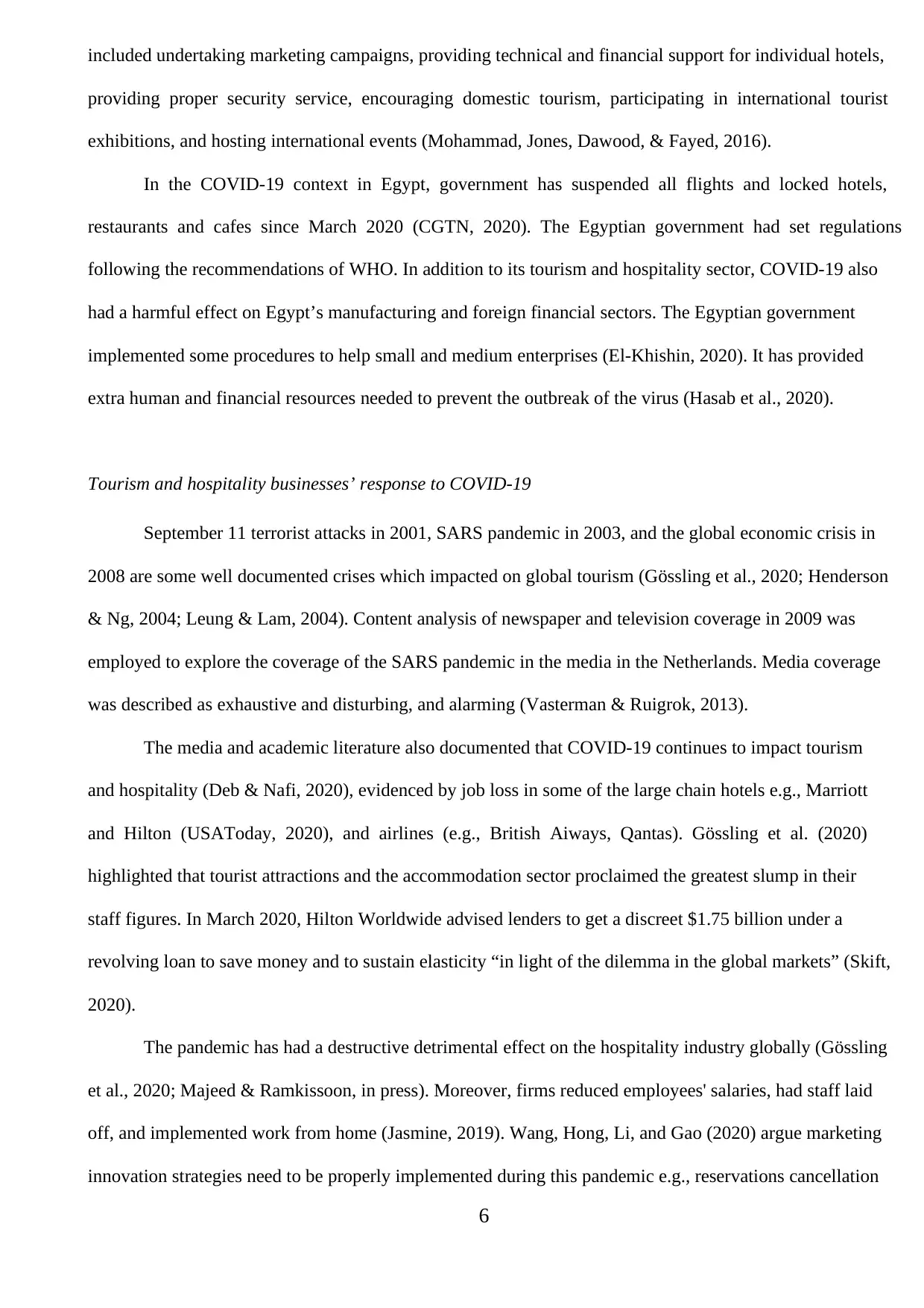
6
included undertaking marketing campaigns, providing technical and financial support for individual hotels,
providing proper security service, encouraging domestic tourism, participating in international tourist
exhibitions, and hosting international events (Mohammad, Jones, Dawood, & Fayed, 2016).
In the COVID-19 context in Egypt, government has suspended all flights and locked hotels,
restaurants and cafes since March 2020 (CGTN, 2020). The Egyptian government had set regulations
following the recommendations of WHO. In addition to its tourism and hospitality sector, COVID-19 also
had a harmful effect on Egypt’s manufacturing and foreign financial sectors. The Egyptian government
implemented some procedures to help small and medium enterprises (El-Khishin, 2020). It has provided
extra human and financial resources needed to prevent the outbreak of the virus (Hasab et al., 2020).
Tourism and hospitality businesses’ response to COVID-19
September 11 terrorist attacks in 2001, SARS pandemic in 2003, and the global economic crisis in
2008 are some well documented crises which impacted on global tourism (Gössling et al., 2020; Henderson
& Ng, 2004; Leung & Lam, 2004). Content analysis of newspaper and television coverage in 2009 was
employed to explore the coverage of the SARS pandemic in the media in the Netherlands. Media coverage
was described as exhaustive and disturbing, and alarming (Vasterman & Ruigrok, 2013).
The media and academic literature also documented that COVID-19 continues to impact tourism
and hospitality (Deb & Nafi, 2020), evidenced by job loss in some of the large chain hotels e.g., Marriott
and Hilton (USAToday, 2020), and airlines (e.g., British Aiways, Qantas). Gössling et al. (2020)
highlighted that tourist attractions and the accommodation sector proclaimed the greatest slump in their
staff figures. In March 2020, Hilton Worldwide advised lenders to get a discreet $1.75 billion under a
revolving loan to save money and to sustain elasticity “in light of the dilemma in the global markets” (Skift,
2020).
The pandemic has had a destructive detrimental effect on the hospitality industry globally (Gössling
et al., 2020; Majeed & Ramkissoon, in press). Moreover, firms reduced employees' salaries, had staff laid
off, and implemented work from home (Jasmine, 2019). Wang, Hong, Li, and Gao (2020) argue marketing
innovation strategies need to be properly implemented during this pandemic e.g., reservations cancellation
included undertaking marketing campaigns, providing technical and financial support for individual hotels,
providing proper security service, encouraging domestic tourism, participating in international tourist
exhibitions, and hosting international events (Mohammad, Jones, Dawood, & Fayed, 2016).
In the COVID-19 context in Egypt, government has suspended all flights and locked hotels,
restaurants and cafes since March 2020 (CGTN, 2020). The Egyptian government had set regulations
following the recommendations of WHO. In addition to its tourism and hospitality sector, COVID-19 also
had a harmful effect on Egypt’s manufacturing and foreign financial sectors. The Egyptian government
implemented some procedures to help small and medium enterprises (El-Khishin, 2020). It has provided
extra human and financial resources needed to prevent the outbreak of the virus (Hasab et al., 2020).
Tourism and hospitality businesses’ response to COVID-19
September 11 terrorist attacks in 2001, SARS pandemic in 2003, and the global economic crisis in
2008 are some well documented crises which impacted on global tourism (Gössling et al., 2020; Henderson
& Ng, 2004; Leung & Lam, 2004). Content analysis of newspaper and television coverage in 2009 was
employed to explore the coverage of the SARS pandemic in the media in the Netherlands. Media coverage
was described as exhaustive and disturbing, and alarming (Vasterman & Ruigrok, 2013).
The media and academic literature also documented that COVID-19 continues to impact tourism
and hospitality (Deb & Nafi, 2020), evidenced by job loss in some of the large chain hotels e.g., Marriott
and Hilton (USAToday, 2020), and airlines (e.g., British Aiways, Qantas). Gössling et al. (2020)
highlighted that tourist attractions and the accommodation sector proclaimed the greatest slump in their
staff figures. In March 2020, Hilton Worldwide advised lenders to get a discreet $1.75 billion under a
revolving loan to save money and to sustain elasticity “in light of the dilemma in the global markets” (Skift,
2020).
The pandemic has had a destructive detrimental effect on the hospitality industry globally (Gössling
et al., 2020; Majeed & Ramkissoon, in press). Moreover, firms reduced employees' salaries, had staff laid
off, and implemented work from home (Jasmine, 2019). Wang, Hong, Li, and Gao (2020) argue marketing
innovation strategies need to be properly implemented during this pandemic e.g., reservations cancellation
Paraphrase This Document
Need a fresh take? Get an instant paraphrase of this document with our AI Paraphraser
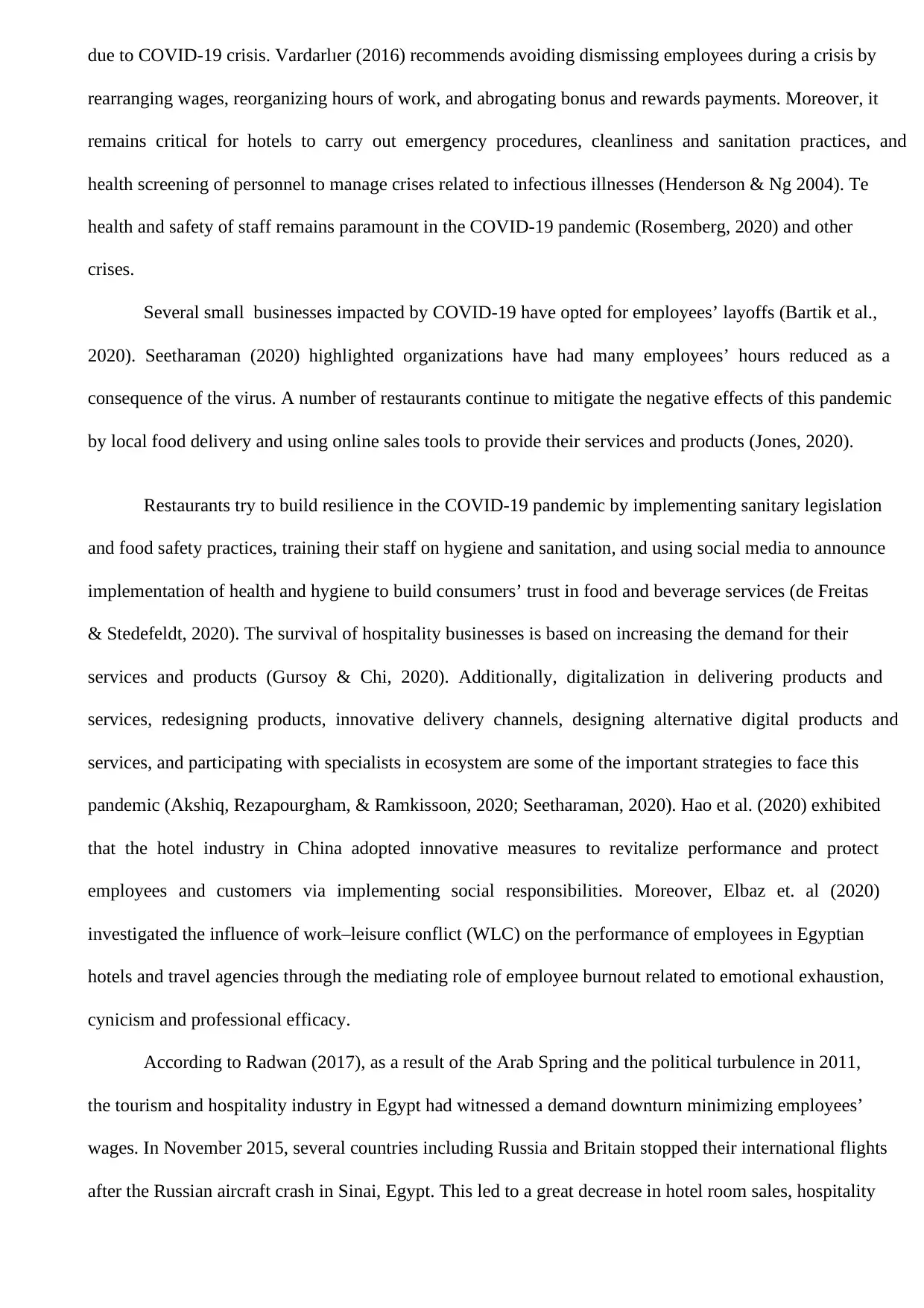
7
due to COVID-19 crisis. Vardarlıer (2016) recommends avoiding dismissing employees during a crisis by
rearranging wages, reorganizing hours of work, and abrogating bonus and rewards payments. Moreover, it
remains critical for hotels to carry out emergency procedures, cleanliness and sanitation practices, and
health screening of personnel to manage crises related to infectious illnesses (Henderson & Ng 2004). Te
health and safety of staff remains paramount in the COVID-19 pandemic (Rosemberg, 2020) and other
crises.
Several small businesses impacted by COVID-19 have opted for employees’ layoffs (Bartik et al.,
2020). Seetharaman (2020) highlighted organizations have had many employees’ hours reduced as a
consequence of the virus. A number of restaurants continue to mitigate the negative effects of this pandemic
by local food delivery and using online sales tools to provide their services and products (Jones, 2020).
Restaurants try to build resilience in the COVID-19 pandemic by implementing sanitary legislation
and food safety practices, training their staff on hygiene and sanitation, and using social media to announce
implementation of health and hygiene to build consumers’ trust in food and beverage services (de Freitas
& Stedefeldt, 2020). The survival of hospitality businesses is based on increasing the demand for their
services and products (Gursoy & Chi, 2020). Additionally, digitalization in delivering products and
services, redesigning products, innovative delivery channels, designing alternative digital products and
services, and participating with specialists in ecosystem are some of the important strategies to face this
pandemic (Akshiq, Rezapourgham, & Ramkissoon, 2020; Seetharaman, 2020). Hao et al. (2020) exhibited
that the hotel industry in China adopted innovative measures to revitalize performance and protect
employees and customers via implementing social responsibilities. Moreover, Elbaz et. al (2020)
investigated the influence of work–leisure conflict (WLC) on the performance of employees in Egyptian
hotels and travel agencies through the mediating role of employee burnout related to emotional exhaustion,
cynicism and professional efficacy.
According to Radwan (2017), as a result of the Arab Spring and the political turbulence in 2011,
the tourism and hospitality industry in Egypt had witnessed a demand downturn minimizing employees’
wages. In November 2015, several countries including Russia and Britain stopped their international flights
after the Russian aircraft crash in Sinai, Egypt. This led to a great decrease in hotel room sales, hospitality
due to COVID-19 crisis. Vardarlıer (2016) recommends avoiding dismissing employees during a crisis by
rearranging wages, reorganizing hours of work, and abrogating bonus and rewards payments. Moreover, it
remains critical for hotels to carry out emergency procedures, cleanliness and sanitation practices, and
health screening of personnel to manage crises related to infectious illnesses (Henderson & Ng 2004). Te
health and safety of staff remains paramount in the COVID-19 pandemic (Rosemberg, 2020) and other
crises.
Several small businesses impacted by COVID-19 have opted for employees’ layoffs (Bartik et al.,
2020). Seetharaman (2020) highlighted organizations have had many employees’ hours reduced as a
consequence of the virus. A number of restaurants continue to mitigate the negative effects of this pandemic
by local food delivery and using online sales tools to provide their services and products (Jones, 2020).
Restaurants try to build resilience in the COVID-19 pandemic by implementing sanitary legislation
and food safety practices, training their staff on hygiene and sanitation, and using social media to announce
implementation of health and hygiene to build consumers’ trust in food and beverage services (de Freitas
& Stedefeldt, 2020). The survival of hospitality businesses is based on increasing the demand for their
services and products (Gursoy & Chi, 2020). Additionally, digitalization in delivering products and
services, redesigning products, innovative delivery channels, designing alternative digital products and
services, and participating with specialists in ecosystem are some of the important strategies to face this
pandemic (Akshiq, Rezapourgham, & Ramkissoon, 2020; Seetharaman, 2020). Hao et al. (2020) exhibited
that the hotel industry in China adopted innovative measures to revitalize performance and protect
employees and customers via implementing social responsibilities. Moreover, Elbaz et. al (2020)
investigated the influence of work–leisure conflict (WLC) on the performance of employees in Egyptian
hotels and travel agencies through the mediating role of employee burnout related to emotional exhaustion,
cynicism and professional efficacy.
According to Radwan (2017), as a result of the Arab Spring and the political turbulence in 2011,
the tourism and hospitality industry in Egypt had witnessed a demand downturn minimizing employees’
wages. In November 2015, several countries including Russia and Britain stopped their international flights
after the Russian aircraft crash in Sinai, Egypt. This led to a great decrease in hotel room sales, hospitality
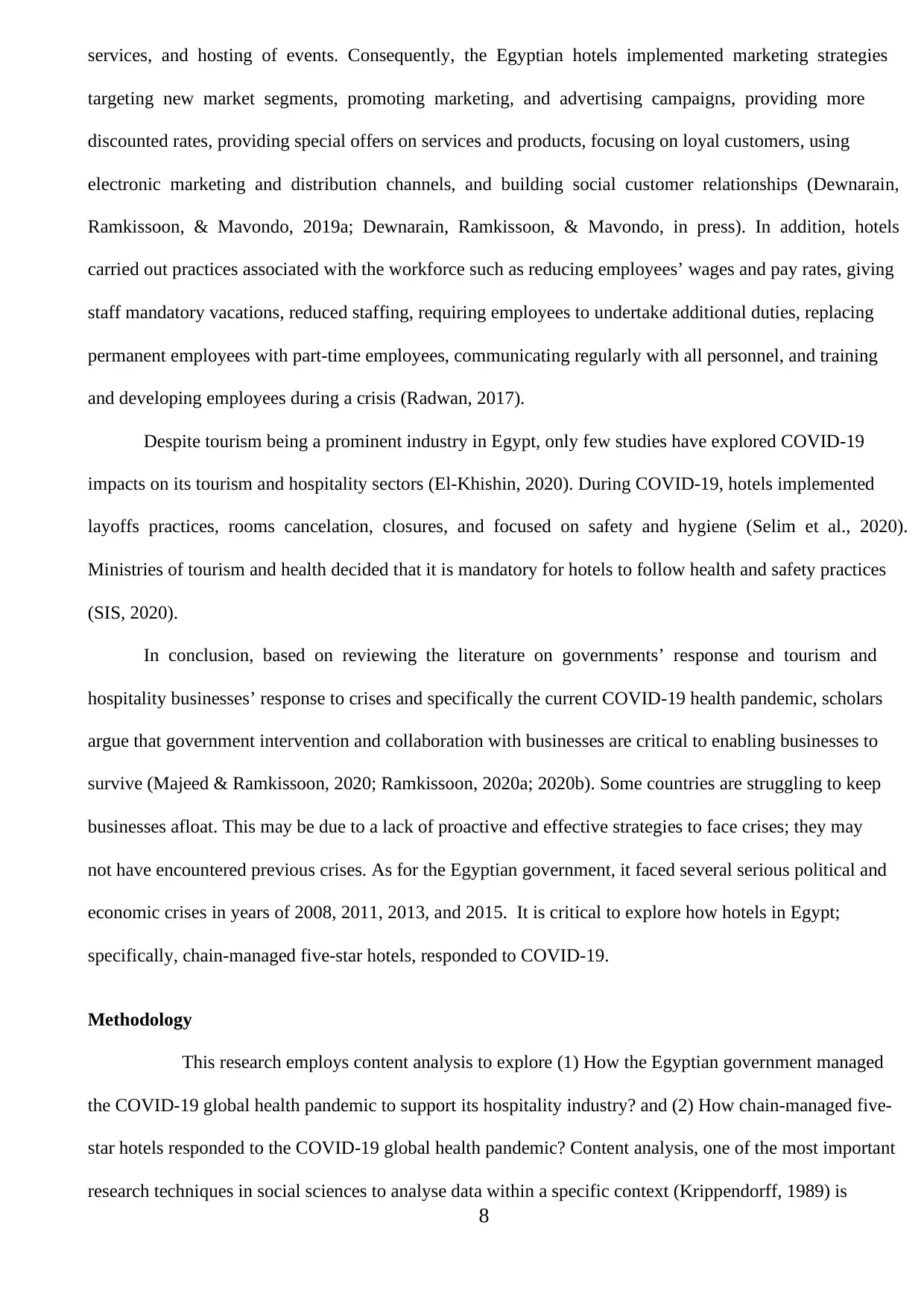
8
services, and hosting of events. Consequently, the Egyptian hotels implemented marketing strategies
targeting new market segments, promoting marketing, and advertising campaigns, providing more
discounted rates, providing special offers on services and products, focusing on loyal customers, using
electronic marketing and distribution channels, and building social customer relationships (Dewnarain,
Ramkissoon, & Mavondo, 2019a; Dewnarain, Ramkissoon, & Mavondo, in press). In addition, hotels
carried out practices associated with the workforce such as reducing employees’ wages and pay rates, giving
staff mandatory vacations, reduced staffing, requiring employees to undertake additional duties, replacing
permanent employees with part-time employees, communicating regularly with all personnel, and training
and developing employees during a crisis (Radwan, 2017).
Despite tourism being a prominent industry in Egypt, only few studies have explored COVID-19
impacts on its tourism and hospitality sectors (El-Khishin, 2020). During COVID-19, hotels implemented
layoffs practices, rooms cancelation, closures, and focused on safety and hygiene (Selim et al., 2020).
Ministries of tourism and health decided that it is mandatory for hotels to follow health and safety practices
(SIS, 2020).
In conclusion, based on reviewing the literature on governments’ response and tourism and
hospitality businesses’ response to crises and specifically the current COVID-19 health pandemic, scholars
argue that government intervention and collaboration with businesses are critical to enabling businesses to
survive (Majeed & Ramkissoon, 2020; Ramkissoon, 2020a; 2020b). Some countries are struggling to keep
businesses afloat. This may be due to a lack of proactive and effective strategies to face crises; they may
not have encountered previous crises. As for the Egyptian government, it faced several serious political and
economic crises in years of 2008, 2011, 2013, and 2015. It is critical to explore how hotels in Egypt;
specifically, chain-managed five-star hotels, responded to COVID-19.
Methodology
This research employs content analysis to explore (1) How the Egyptian government managed
the COVID-19 global health pandemic to support its hospitality industry? and (2) How chain-managed five-
star hotels responded to the COVID-19 global health pandemic? Content analysis, one of the most important
research techniques in social sciences to analyse data within a specific context (Krippendorff, 1989) is
services, and hosting of events. Consequently, the Egyptian hotels implemented marketing strategies
targeting new market segments, promoting marketing, and advertising campaigns, providing more
discounted rates, providing special offers on services and products, focusing on loyal customers, using
electronic marketing and distribution channels, and building social customer relationships (Dewnarain,
Ramkissoon, & Mavondo, 2019a; Dewnarain, Ramkissoon, & Mavondo, in press). In addition, hotels
carried out practices associated with the workforce such as reducing employees’ wages and pay rates, giving
staff mandatory vacations, reduced staffing, requiring employees to undertake additional duties, replacing
permanent employees with part-time employees, communicating regularly with all personnel, and training
and developing employees during a crisis (Radwan, 2017).
Despite tourism being a prominent industry in Egypt, only few studies have explored COVID-19
impacts on its tourism and hospitality sectors (El-Khishin, 2020). During COVID-19, hotels implemented
layoffs practices, rooms cancelation, closures, and focused on safety and hygiene (Selim et al., 2020).
Ministries of tourism and health decided that it is mandatory for hotels to follow health and safety practices
(SIS, 2020).
In conclusion, based on reviewing the literature on governments’ response and tourism and
hospitality businesses’ response to crises and specifically the current COVID-19 health pandemic, scholars
argue that government intervention and collaboration with businesses are critical to enabling businesses to
survive (Majeed & Ramkissoon, 2020; Ramkissoon, 2020a; 2020b). Some countries are struggling to keep
businesses afloat. This may be due to a lack of proactive and effective strategies to face crises; they may
not have encountered previous crises. As for the Egyptian government, it faced several serious political and
economic crises in years of 2008, 2011, 2013, and 2015. It is critical to explore how hotels in Egypt;
specifically, chain-managed five-star hotels, responded to COVID-19.
Methodology
This research employs content analysis to explore (1) How the Egyptian government managed
the COVID-19 global health pandemic to support its hospitality industry? and (2) How chain-managed five-
star hotels responded to the COVID-19 global health pandemic? Content analysis, one of the most important
research techniques in social sciences to analyse data within a specific context (Krippendorff, 1989) is
⊘ This is a preview!⊘
Do you want full access?
Subscribe today to unlock all pages.

Trusted by 1+ million students worldwide
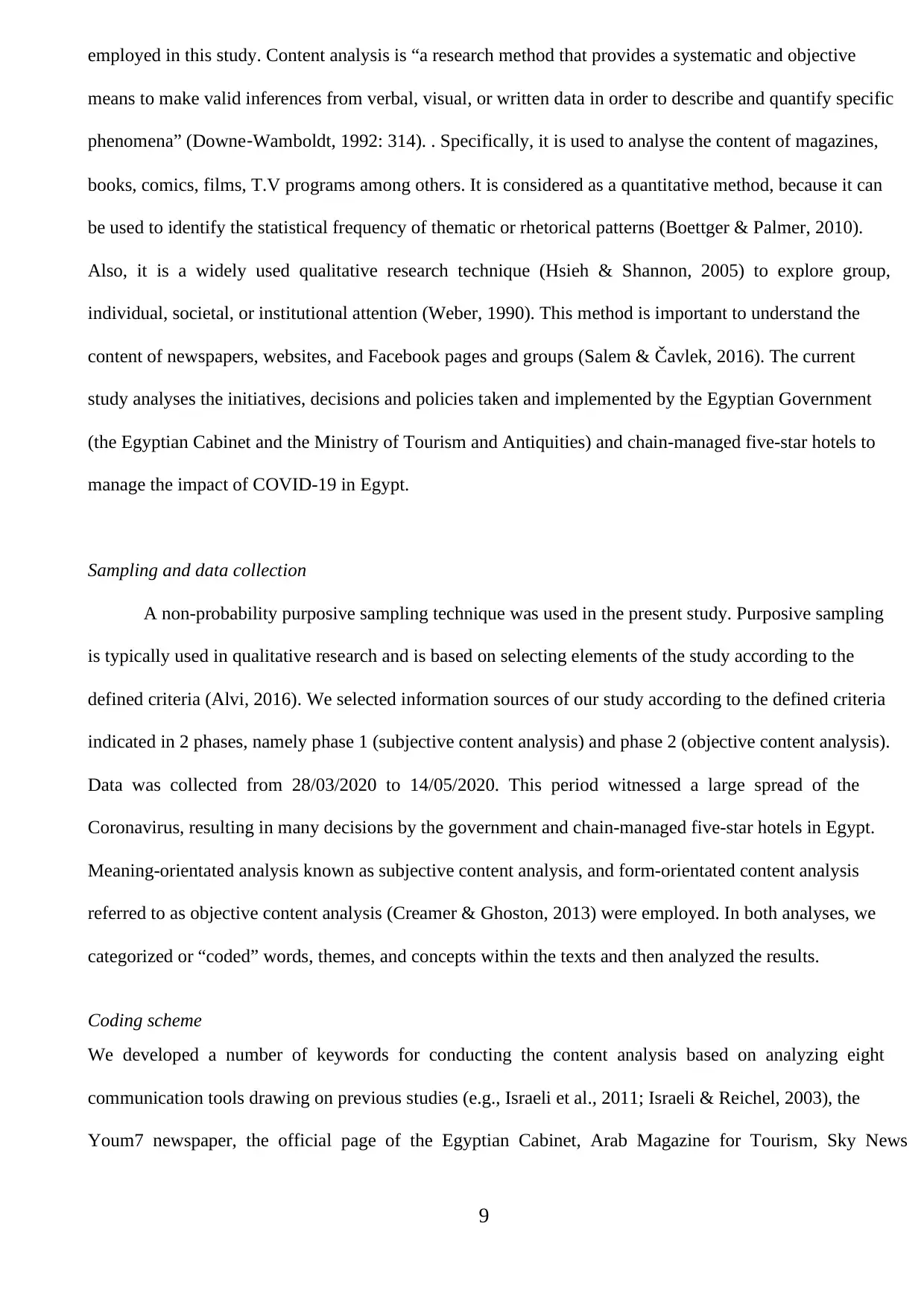
9
employed in this study. Content analysis is “a research method that provides a systematic and objective
means to make valid inferences from verbal, visual, or written data in order to describe and quantify specific
phenomena” (Downe-Wamboldt, 1992: 314). . Specifically, it is used to analyse the content of magazines,
books, comics, films, T.V programs among others. It is considered as a quantitative method, because it can
be used to identify the statistical frequency of thematic or rhetorical patterns (Boettger & Palmer, 2010).
Also, it is a widely used qualitative research technique (Hsieh & Shannon, 2005) to explore group,
individual, societal, or institutional attention (Weber, 1990). This method is important to understand the
content of newspapers, websites, and Facebook pages and groups (Salem & Čavlek, 2016). The current
study analyses the initiatives, decisions and policies taken and implemented by the Egyptian Government
(the Egyptian Cabinet and the Ministry of Tourism and Antiquities) and chain-managed five-star hotels to
manage the impact of COVID-19 in Egypt.
Sampling and data collection
A non-probability purposive sampling technique was used in the present study. Purposive sampling
is typically used in qualitative research and is based on selecting elements of the study according to the
defined criteria (Alvi, 2016). We selected information sources of our study according to the defined criteria
indicated in 2 phases, namely phase 1 (subjective content analysis) and phase 2 (objective content analysis).
Data was collected from 28/03/2020 to 14/05/2020. This period witnessed a large spread of the
Coronavirus, resulting in many decisions by the government and chain-managed five-star hotels in Egypt.
Meaning-orientated analysis known as subjective content analysis, and form-orientated content analysis
referred to as objective content analysis (Creamer & Ghoston, 2013) were employed. In both analyses, we
categorized or “coded” words, themes, and concepts within the texts and then analyzed the results.
Coding scheme
We developed a number of keywords for conducting the content analysis based on analyzing eight
communication tools drawing on previous studies (e.g., Israeli et al., 2011; Israeli & Reichel, 2003), the
Youm7 newspaper, the official page of the Egyptian Cabinet, Arab Magazine for Tourism, Sky News
employed in this study. Content analysis is “a research method that provides a systematic and objective
means to make valid inferences from verbal, visual, or written data in order to describe and quantify specific
phenomena” (Downe-Wamboldt, 1992: 314). . Specifically, it is used to analyse the content of magazines,
books, comics, films, T.V programs among others. It is considered as a quantitative method, because it can
be used to identify the statistical frequency of thematic or rhetorical patterns (Boettger & Palmer, 2010).
Also, it is a widely used qualitative research technique (Hsieh & Shannon, 2005) to explore group,
individual, societal, or institutional attention (Weber, 1990). This method is important to understand the
content of newspapers, websites, and Facebook pages and groups (Salem & Čavlek, 2016). The current
study analyses the initiatives, decisions and policies taken and implemented by the Egyptian Government
(the Egyptian Cabinet and the Ministry of Tourism and Antiquities) and chain-managed five-star hotels to
manage the impact of COVID-19 in Egypt.
Sampling and data collection
A non-probability purposive sampling technique was used in the present study. Purposive sampling
is typically used in qualitative research and is based on selecting elements of the study according to the
defined criteria (Alvi, 2016). We selected information sources of our study according to the defined criteria
indicated in 2 phases, namely phase 1 (subjective content analysis) and phase 2 (objective content analysis).
Data was collected from 28/03/2020 to 14/05/2020. This period witnessed a large spread of the
Coronavirus, resulting in many decisions by the government and chain-managed five-star hotels in Egypt.
Meaning-orientated analysis known as subjective content analysis, and form-orientated content analysis
referred to as objective content analysis (Creamer & Ghoston, 2013) were employed. In both analyses, we
categorized or “coded” words, themes, and concepts within the texts and then analyzed the results.
Coding scheme
We developed a number of keywords for conducting the content analysis based on analyzing eight
communication tools drawing on previous studies (e.g., Israeli et al., 2011; Israeli & Reichel, 2003), the
Youm7 newspaper, the official page of the Egyptian Cabinet, Arab Magazine for Tourism, Sky News
Paraphrase This Document
Need a fresh take? Get an instant paraphrase of this document with our AI Paraphraser
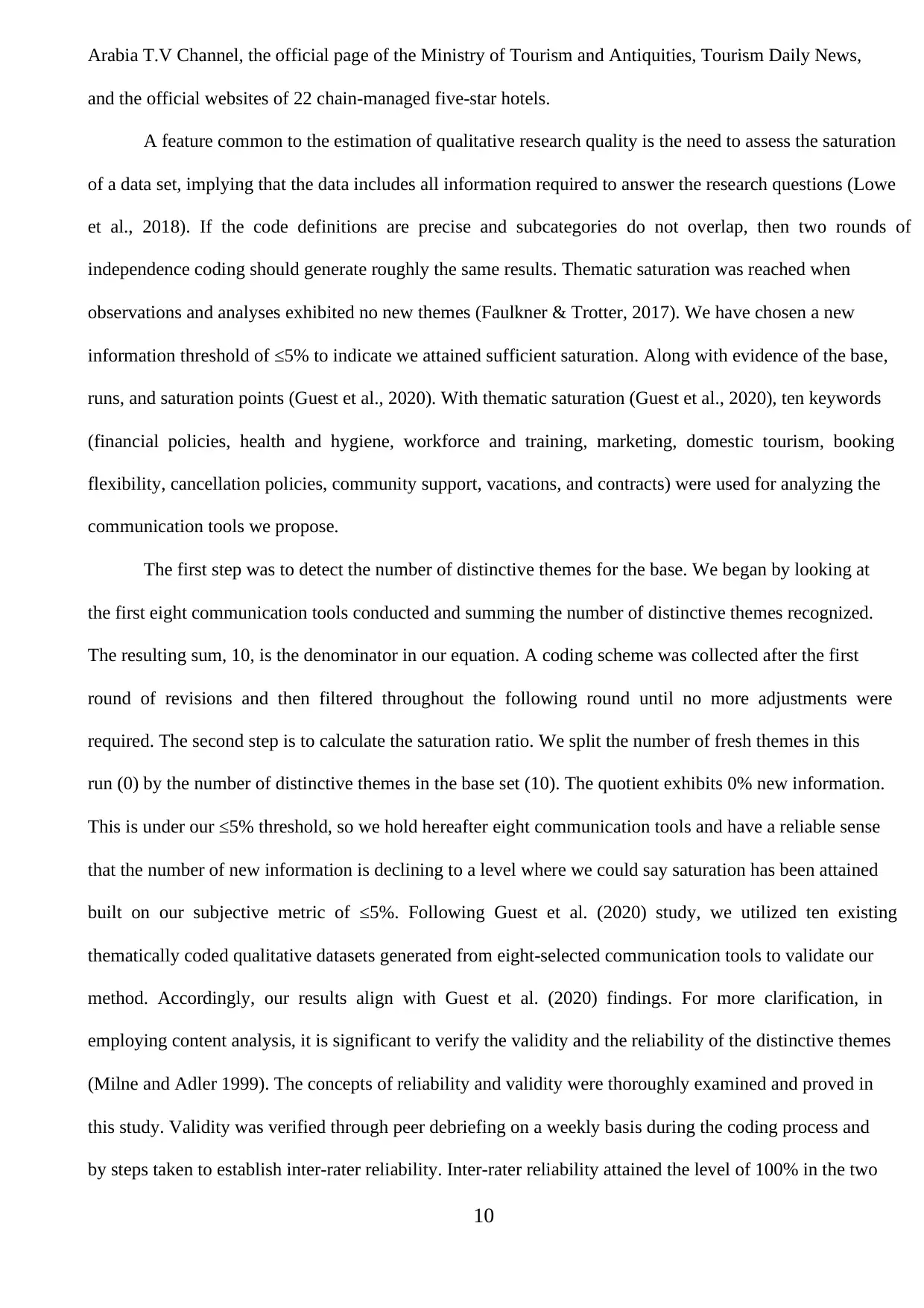
10
Arabia T.V Channel, the official page of the Ministry of Tourism and Antiquities, Tourism Daily News,
and the official websites of 22 chain-managed five-star hotels.
A feature common to the estimation of qualitative research quality is the need to assess the saturation
of a data set, implying that the data includes all information required to answer the research questions (Lowe
et al., 2018). If the code definitions are precise and subcategories do not overlap, then two rounds of
independence coding should generate roughly the same results. Thematic saturation was reached when
observations and analyses exhibited no new themes (Faulkner & Trotter, 2017). We have chosen a new
information threshold of ≤5% to indicate we attained sufficient saturation. Along with evidence of the base,
runs, and saturation points (Guest et al., 2020). With thematic saturation (Guest et al., 2020), ten keywords
(financial policies, health and hygiene, workforce and training, marketing, domestic tourism, booking
flexibility, cancellation policies, community support, vacations, and contracts) were used for analyzing the
communication tools we propose.
The first step was to detect the number of distinctive themes for the base. We began by looking at
the first eight communication tools conducted and summing the number of distinctive themes recognized.
The resulting sum, 10, is the denominator in our equation. A coding scheme was collected after the first
round of revisions and then filtered throughout the following round until no more adjustments were
required. The second step is to calculate the saturation ratio. We split the number of fresh themes in this
run (0) by the number of distinctive themes in the base set (10). The quotient exhibits 0% new information.
This is under our ≤5% threshold, so we hold hereafter eight communication tools and have a reliable sense
that the number of new information is declining to a level where we could say saturation has been attained
built on our subjective metric of ≤5%. Following Guest et al. (2020) study, we utilized ten existing
thematically coded qualitative datasets generated from eight-selected communication tools to validate our
method. Accordingly, our results align with Guest et al. (2020) findings. For more clarification, in
employing content analysis, it is significant to verify the validity and the reliability of the distinctive themes
(Milne and Adler 1999). The concepts of reliability and validity were thoroughly examined and proved in
this study. Validity was verified through peer debriefing on a weekly basis during the coding process and
by steps taken to establish inter-rater reliability. Inter-rater reliability attained the level of 100% in the two
Arabia T.V Channel, the official page of the Ministry of Tourism and Antiquities, Tourism Daily News,
and the official websites of 22 chain-managed five-star hotels.
A feature common to the estimation of qualitative research quality is the need to assess the saturation
of a data set, implying that the data includes all information required to answer the research questions (Lowe
et al., 2018). If the code definitions are precise and subcategories do not overlap, then two rounds of
independence coding should generate roughly the same results. Thematic saturation was reached when
observations and analyses exhibited no new themes (Faulkner & Trotter, 2017). We have chosen a new
information threshold of ≤5% to indicate we attained sufficient saturation. Along with evidence of the base,
runs, and saturation points (Guest et al., 2020). With thematic saturation (Guest et al., 2020), ten keywords
(financial policies, health and hygiene, workforce and training, marketing, domestic tourism, booking
flexibility, cancellation policies, community support, vacations, and contracts) were used for analyzing the
communication tools we propose.
The first step was to detect the number of distinctive themes for the base. We began by looking at
the first eight communication tools conducted and summing the number of distinctive themes recognized.
The resulting sum, 10, is the denominator in our equation. A coding scheme was collected after the first
round of revisions and then filtered throughout the following round until no more adjustments were
required. The second step is to calculate the saturation ratio. We split the number of fresh themes in this
run (0) by the number of distinctive themes in the base set (10). The quotient exhibits 0% new information.
This is under our ≤5% threshold, so we hold hereafter eight communication tools and have a reliable sense
that the number of new information is declining to a level where we could say saturation has been attained
built on our subjective metric of ≤5%. Following Guest et al. (2020) study, we utilized ten existing
thematically coded qualitative datasets generated from eight-selected communication tools to validate our
method. Accordingly, our results align with Guest et al. (2020) findings. For more clarification, in
employing content analysis, it is significant to verify the validity and the reliability of the distinctive themes
(Milne and Adler 1999). The concepts of reliability and validity were thoroughly examined and proved in
this study. Validity was verified through peer debriefing on a weekly basis during the coding process and
by steps taken to establish inter-rater reliability. Inter-rater reliability attained the level of 100% in the two
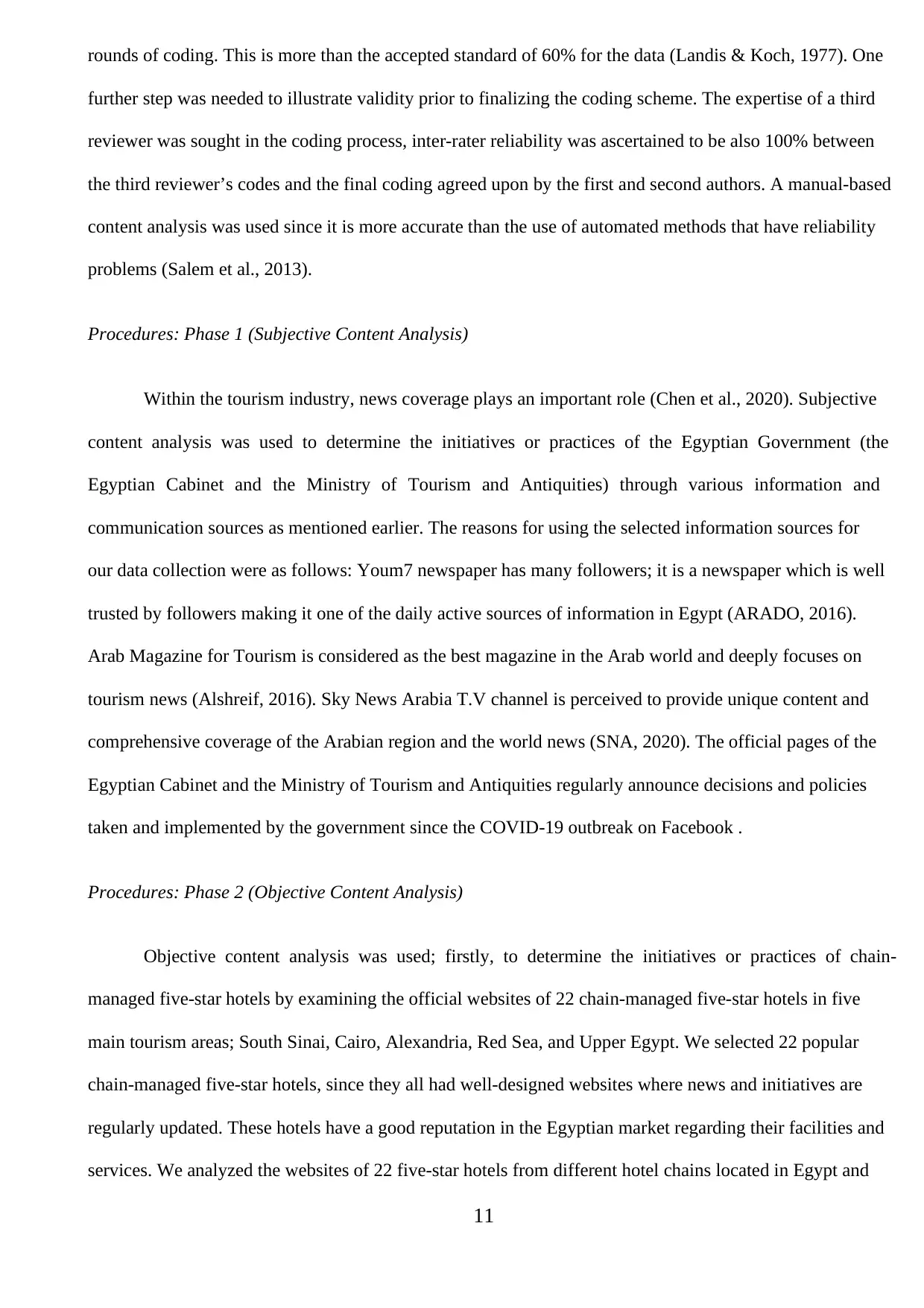
11
rounds of coding. This is more than the accepted standard of 60% for the data (Landis & Koch, 1977). One
further step was needed to illustrate validity prior to finalizing the coding scheme. The expertise of a third
reviewer was sought in the coding process, inter-rater reliability was ascertained to be also 100% between
the third reviewer’s codes and the final coding agreed upon by the first and second authors. A manual-based
content analysis was used since it is more accurate than the use of automated methods that have reliability
problems (Salem et al., 2013).
Procedures: Phase 1 (Subjective Content Analysis)
Within the tourism industry, news coverage plays an important role (Chen et al., 2020). Subjective
content analysis was used to determine the initiatives or practices of the Egyptian Government (the
Egyptian Cabinet and the Ministry of Tourism and Antiquities) through various information and
communication sources as mentioned earlier. The reasons for using the selected information sources for
our data collection were as follows: Youm7 newspaper has many followers; it is a newspaper which is well
trusted by followers making it one of the daily active sources of information in Egypt (ARADO, 2016).
Arab Magazine for Tourism is considered as the best magazine in the Arab world and deeply focuses on
tourism news (Alshreif, 2016). Sky News Arabia T.V channel is perceived to provide unique content and
comprehensive coverage of the Arabian region and the world news (SNA, 2020). The official pages of the
Egyptian Cabinet and the Ministry of Tourism and Antiquities regularly announce decisions and policies
taken and implemented by the government since the COVID-19 outbreak on Facebook .
Procedures: Phase 2 (Objective Content Analysis)
Objective content analysis was used; firstly, to determine the initiatives or practices of chain-
managed five-star hotels by examining the official websites of 22 chain-managed five-star hotels in five
main tourism areas; South Sinai, Cairo, Alexandria, Red Sea, and Upper Egypt. We selected 22 popular
chain-managed five-star hotels, since they all had well-designed websites where news and initiatives are
regularly updated. These hotels have a good reputation in the Egyptian market regarding their facilities and
services. We analyzed the websites of 22 five-star hotels from different hotel chains located in Egypt and
rounds of coding. This is more than the accepted standard of 60% for the data (Landis & Koch, 1977). One
further step was needed to illustrate validity prior to finalizing the coding scheme. The expertise of a third
reviewer was sought in the coding process, inter-rater reliability was ascertained to be also 100% between
the third reviewer’s codes and the final coding agreed upon by the first and second authors. A manual-based
content analysis was used since it is more accurate than the use of automated methods that have reliability
problems (Salem et al., 2013).
Procedures: Phase 1 (Subjective Content Analysis)
Within the tourism industry, news coverage plays an important role (Chen et al., 2020). Subjective
content analysis was used to determine the initiatives or practices of the Egyptian Government (the
Egyptian Cabinet and the Ministry of Tourism and Antiquities) through various information and
communication sources as mentioned earlier. The reasons for using the selected information sources for
our data collection were as follows: Youm7 newspaper has many followers; it is a newspaper which is well
trusted by followers making it one of the daily active sources of information in Egypt (ARADO, 2016).
Arab Magazine for Tourism is considered as the best magazine in the Arab world and deeply focuses on
tourism news (Alshreif, 2016). Sky News Arabia T.V channel is perceived to provide unique content and
comprehensive coverage of the Arabian region and the world news (SNA, 2020). The official pages of the
Egyptian Cabinet and the Ministry of Tourism and Antiquities regularly announce decisions and policies
taken and implemented by the government since the COVID-19 outbreak on Facebook .
Procedures: Phase 2 (Objective Content Analysis)
Objective content analysis was used; firstly, to determine the initiatives or practices of chain-
managed five-star hotels by examining the official websites of 22 chain-managed five-star hotels in five
main tourism areas; South Sinai, Cairo, Alexandria, Red Sea, and Upper Egypt. We selected 22 popular
chain-managed five-star hotels, since they all had well-designed websites where news and initiatives are
regularly updated. These hotels have a good reputation in the Egyptian market regarding their facilities and
services. We analyzed the websites of 22 five-star hotels from different hotel chains located in Egypt and
⊘ This is a preview!⊘
Do you want full access?
Subscribe today to unlock all pages.

Trusted by 1+ million students worldwide
1 out of 35
Related Documents
Your All-in-One AI-Powered Toolkit for Academic Success.
+13062052269
info@desklib.com
Available 24*7 on WhatsApp / Email
![[object Object]](/_next/static/media/star-bottom.7253800d.svg)
Unlock your academic potential
Copyright © 2020–2025 A2Z Services. All Rights Reserved. Developed and managed by ZUCOL.





